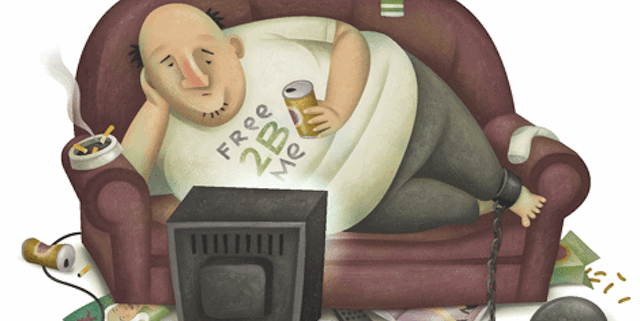Take a minute, watch beginning of this video (sorry, only available for US viewers)!
http://youtu.be/nMxIKS-z4Go
The first time I heard Yosemite Sam’s song I laughed out loud. I love Yosemite’s dance and the pride he exudes in “sticking to his guns.”
Then while at the Symposium for Connected Health 2013, I found myself thinking of this song. There seems to be an attitude among people in health care–public health, health insurance, government, the pharmaceutical industry, marketers and all the others who are spreading the glories of awareness and wellness–that they must change millions of Yosemite Sams. Millions are singing “I’m just good at making bad decisions….”
It was a mixed bag at the conference with some speakers touting an idea of the Yosemite Sam public while others proposing a different scenario. I’d like to propose to the many do-gooders that Yosemite Sam-itosis is not prevalent and that there are not millions of Yosemite Sams in the US.
One of the speakers who really understands what is happening when people are trying to change behavior and maintain that change was the former CEO of Weight Watchers, David Kirchhoff. Kirchhoff provided a vivid description of what is needed for weight loss. He first quoted Brian Wansink, Cornell’s Food researcher. Wansink has found that on average, Americans make over 200 food-related decisions a day. This research illustrates that “The reasons behind why people overeat are difficult and multifaceted,” Kirchhoff explains.
The recognition by the American Medical Association that obesity is a disease is a crucial change in attitudes according to Kirchhoff. “The issue is our brain…we aren’t eating from the hemostatic eating system…but we are really eating from a hedonic eating system…emotional eating, subconscious eating, habit pathways, fear of failure and fear of success….” Obesity and overeating are complex problems and seeing it as a failure of will is simplistic, victim blaming and not useful.
Intensive behavioral therapy with significant group support is necessary for getting started and for keeping going, Kirchhoff believes.
A randomized controlled trial published online in October 2013, found that overweight and obese adults who followed Weight Watchers, which the study describes as a community-based weight loss intervention, lost more weight than people who tried to lose weight on their own. Those who used the group meetings, mobile apps and online tools lost the most weight.
The Weight Watchers model seems to implement a theoretical model for motivation called the Self Determination Theory. What is especially profound about this model is that maintenance of that change is integral to it. There are over 150 studies that have used this model for health behavior change including increasing and maintaining physical activity, diabetes control, weight control and tobacco cessation. Importantly, the studies describe maintenance of behaviors long after the intervention has ended.
Self determination theory states that our natural tendency to psychological growth, physical health and social wellbeing is supported by having three psychological needs met. Those needs are:
- Autonomy: meaning we need to feel as though we control our own behaviors, that we choose them.
- Competence: feeling able to achieve our outcomes and
- Relatedness: we need to experience genuine support, care and trust from healthcare providers family, significant others.
Another part of the self-determination model is that the people who are involved in behavior change actually decide themselves what it is that they are living for…their goals in life…helping them to identify life aspirations. Then facilitating reflection n how they feel about the risks they face with their behaviors and the reductions in risk that can happen without the behavior. It takes work to facilitate personal reflection on how their behaviors impact accomplishing their goals. It’s all about ownership and supporting others in their life goals.
There are a number of supports that are required for self-determination models of behavior change to work. Here’s a list of need-supportive behaviors derived from self-determination theory:
Autonomy Support
- Elicit and acknowledge the patient’s perspectives and feelings
- Explore the patient’s values and how they relate to the behavior being addressed
- Provide a clear rationale for advice given
- Provide effective options for change and acknowledge the option of not changing
- Support the patient’s self-initiation for change
- Minimize pressure and control
Competence Support
- Be positive that the patient can succeed
- Provide accurate, effectance-relevant feedback
- Identify barriers to change
- Engage the patient in skills-building and problem-solving
- Develop a plan that is appropriate for the patient’s abilities
- Reframe failures as short successes
Relatedness Support
- Develop empathy
- Develop a warm, positive interpersonal relationship
- Remain non-judgmental and provide unconditional positive regard
Bottom line
All of this is to say, that behavior change is not simple, it is not easy, it is not about using an app or taking a pill. It is not about people “being good about making bad decisions.” Those who say, “just quit” or who blame people who try and fail are essentially victim blaming. If you are thin and do not smoke and do not have diabetes, don’t look down at those who are smoking, have diabetes and are overweight. Those people have probably tried and tried to succeed in change. The sooner that our nation comes to grips with this fact and expends resources to support intensive behavioral therapy with significant group support based on self determination models, the better off everyone will be. Behavior change is incredibly difficult. Sympathy and understanding as well as support are needed.






I loved your blog article. Really Cool.